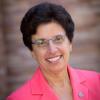St. Teresa of Avila, a Carmelite Sister who lived from 1515 to 1582, describes prayer as “looking at God looking at me.” I believe this is the goal of all spirituality — whether Christian, Jew, Muslim, Hindu or Buddhist — to see others, our world and ourselves with the eyes of God.
There are a few extraordinary people who inspire us to see as God sees. I had the opportunity to look into the eyes of Pope Francis for the first time in May 2014 in St. Peter’s Square. As I watched him address the crowd and warmly, even intimately, greet so many, I realized that he was seeing them with the eyes of God, unconditionally loving the reality and mystery of each and every one. Perhaps this is why one man aligned to so many specific moral and theological beliefs can have such universal attraction and appeal. His very person inspires one to reach beyond religions and issues and connect to the God within.
This coming week Pope Francis will be among us.
He will be addressing the powerful at a joint session of Congress and at the United Nations and listening to the vulnerable at a homeless shelter in Washington D.C., a correctional facility in Philadelphia and a Catholic school in Harlem. We will witness first hand that his mystique is both consistent and unpredictable. His alignment with the vulnerable and disadvantaged is impenetrable — almost to the point of being obstinate. His courageous freedom in the face of power and traditional rubric can be mystifying and uncomfortable. One can never predict when and if he will “break script.” One can only predict that his words and his person, regardless of with whom he is present, will deliver a call to greatness.
There are two coincidental, even opportunistic, events that accompany the pope’s visit. One is the launching of the Sustainable Development Goals, the United Nations aspirational agenda for global action to assure the equality of world populations and the resilience of our environment. These 17 goals — from ending poverty to promoting peaceful and inclusive societies to ensuring sustainable consumption — in many ways frame the life and mission of Pope Francis. There is integrity and power in the consistency of his messages around concern for the poor, respect for the dignity of all persons, compassion for migrants and refuges, search for peace through dialog as well as the sacredness of our relationship with the earth.
In his recent encyclical, “Laudato Sí, on Care for Our Common Home,” he challenges us to a spirituality rooted in the belief that “less is more.” Our happiness lies not in how much we possess or consume, but rather in how grateful we are for the abundance that we have, “a return to that simplicity which allows us to stop and appreciate . . . each person and each thing, learning familiarity with the simplest things and how to enjoy them.” The power of the pope’s message to the United Nations will be rooted in the example of his life even more than in his words.
The second event is the declaration by Pope Francis that 2015 is the Year of Consecrated Life. In the Catholic church consecrated life refers to those who profess the counsels of poverty, chastity and obedience, which includes Catholic sisters, religious brothers and priests. Religious life is identified as a prophetic lifeform in the official documents of the Catholic church. Prophets do not predict the future, but rather uncover the present as it truly is. In this Year of Consecrated Life, Pope Francis calls on religious to “wake up the world, since the distinctive sign of consecrated life is prophecy.”
These two events, the launching of the Sustainable Development Goals and the Year of Consecrated Life, are connected. There are many Catholic sisters at the United Nations representing their religious congregations as non-governmental organizations that have voice but no vote. They participate in major forums of the U.N., strengthen international networks to ensure broad participation of constituents in advocacy efforts and prepare oral and written statements. They act as a global sisterhood representing sisters in the most remote locations in 160 countries. Their sole agenda is to advocate for the poor and the marginalized. As a recognized moral presence, they seek to assure that the Sustainable Development Goals advance the lives of those who are most disadvantaged. True to their prophetic calling, they are a voice that uncovers the present as it truly is.
No matter how close or far away our encounter with Pope Francis may be, no matter how close or far apart we stand on any issue, no matter even our formal religious beliefs, his presence with us has the power to be a grace for all of us “to see as God sees” — to assure that the present is rightly understood in order for our future to be rightly lived.
[A School Sister of Notre Dame, Sr. Rosemarie Nassif oversees the Conrad N. Hilton Foundation’s Catholic Sisters Initiative and its Catholic Education Programs. She is a former advisor to the U.S. Department of Education and served as president of two universities: Holy Names in Oakland and Notre Dame of Maryland in Baltimore.]
* The Conrad N. Hilton Foundation funds Global Sisters Report.
